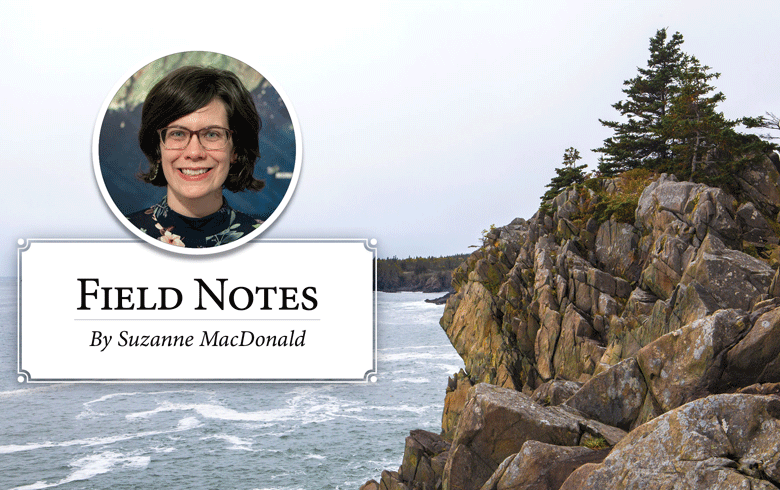“Are we doing hugs?” she asked as she approached me with her eyes sparkling. It had been nearly four years since we had seen each other in person and now, here we were, on Rockland’s Main Street, trying to figure out how to greet each other in the new normal.
Kim Gaffett was the long-time head of town government on Block Island, R.I. She was in the Midcoast earlier this fall visiting friends, and I was thrilled she had reached out to catch up over an outdoor lunch.
While she had to take a ferry and car ride to get here, Kim is no stranger to Maine’s island communities. For more than a decade, she has worked with the Island Institute and our partners to learn how other islands were tackling the issues Block Island has been confronting: island energy systems, expanding broadband access, and managing tick-borne diseases, to name a few.
Not only was Kim willing to pass along what her community was doing, but she was ready to roll up her sleeves and help.
We realized there was so much that Maine islanders could learn from Kim and Block Island. And not only was Kim willing to pass along what her community was doing, but she was ready to roll up her sleeves and help.
Through the Institute’s commitment to connect beyond Maine to help community leaders find answers, Kim participated in exchange trips, presented at conferences, and spent hours providing guidance on the phone and over email. She shared with us how Block Island was able to effectively use its voice in state processes when engaging with offshore wind developers. The nuts and bolts and practical lessons from Kim and her colleagues on Block Island have since been put into practice on islands throughout New England and have even been memorialized in renewable energy processes as far away as Hawaii.
As we sat with her friends, talking about our past collaborations and the thorny issues of the day, Kim’s interest in people on our part of the coast was clear. She has always been ready to show up for us, just as Maine islanders and the Institute have found ways to show up for her.
My thoughts traveled back to the evening before when I had spent several hours online, helping facilitate the biannual gathering of the Climate Strong Islands Network. This new national network is focused on building climate resilience for U.S. islands by developing a federal policy framework and increasing information exchange between communities.
Before the pandemic, we would have gathered in person, but now the powers of Zoom had connected us all from time zones deep into the Pacific all the way to the Caribbean.
The event highlighted how some U.S. islands are responding to climate change: restoring mangrove forests in Puerto Rico after the devastation of hurricanes; indigenous-led climate monitoring on St. Paul Island, Alaska that is informing local and federal decisions on climate adaptation; and progress on ambitious targets for clean energy and economic diversification in Guam.
The common theme was how policies made on the mainland often fail to capture the realities of the island experience.
A decade from now, it’s my hope that we can look back and see that we have found success in our “last best chance” to address the climate crisis here at home and globally—and that we’ve done so in part by showing up for each other.
By coming together to share what those on the front lines of climate change are learning, we will accelerate the pace at which communities can adapt. By organizing ourselves in D.C., we can ensure that the voices of islanders in the U.S.—many of whom have been marginalized by systemic injustices – can be heard more powerfully and that policy can be designed in more equitable ways.
At the Institute, we work to build meaningful relationships to find solutions to problems that often more than one community faces. I’m grateful to Kim for being part of that process. And to our new colleagues in the Climate Strong Islands Network, we look forward to showing up for you.
To learn more about the Climate Strong Islands Network, please visit www.climatestrongislands.org. A case study on Block Island’s efforts with offshore wind can be found at https://www.islandinstitute.org/ii-solution/create-accessibe-learning-opportunities/.
Suzanne MacDonald is chief community development officer with the Island Institute, publisher of The Working Waterfront.





